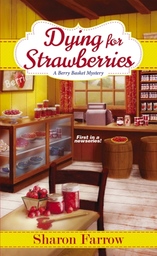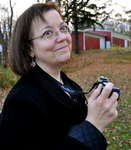|
There is a long tradition of authors using pseudonyms or writing under Anonymous, and I'm always curious about what makes someone wish to write under someone else's name. I asked Sharon Pisacreta to join me on my blog today, to discuss why she uses pseudonyms (FOUR!) and how she chose them. Her first book in a new series, DYING FOR STRAWBERRIES, will be released November 1, 2016.  Along with spies and people in the witness protection program, authors often feel compelled to change identities. My upcoming mystery series will be released under ‘Sharon Farrow’. It will be the fourth name I’ve used as an author. When my stories and articles first began to appear in magazines, I proudly used the name I was born with. Although it was a tricky Italian name that few non-Italians could pronounce, it made my family happy. However I learned that Shakespeare’s question “What’s in a name?” has special meaning for authors. After I sold my first novel, I thought I’d make things easier for my readers and decided on ‘Sharon Kirk’ as a pseudonym (yes, I’m a Trekkie). Unfortunately, someone in production forgot to read my contract and released that first book under my Italian name. Two other books followed, accompanied by numerous calls from my publisher asking how to pronounce ‘Pisacreta’. Sales reps ran into problems with my name when speaking with distributors. One of my novels was sold as part of a six-book package on the Home Shopping Network, eliciting more questions on exactly how the TV host should say my name. My editor finally asked if I would mind taking a pseudonym. I was happy to oblige. This time I went with ‘Cynthia Kirk’. It sounded British, elegant, and impossible to mispronounce. Soon after, I put aside novel writing and returned to magazine work under my maiden name. I got back in the novel writing game when a friend and fellow author convinced me to team up with her on a mystery series. Because our previous novels were in the romance and western genres, we needed a pen name for our historical mystery series. Marketing is everything in publishing, and an author’s name is a form of branding. If readers want to buy your mystery novel, they don’t want to be confused if you also write science fiction under the same name. We wanted an easy name to spell and remember. The result was D.E. Ireland. Since our series is based on Shaw’s Pygmalion and stars Eliza Doolittle, we chose her initials, transposing them for our first name. Ireland was selected because George Bernard Shaw was born and raised in Dublin. As a writing team, a pen name seemed necessary. Few teams publish under one of the pair’s real name. A notable exception is the Ian Rutledge mystery series by Charles Todd, written by Charles and his mother Caroline. Normally, a new pseudonym is created for the duo, such as Alice Alfonsi and husband Marc Cerasino who write as ‘Cleo Coyle’. All writers should keep a few pen names in their back pocket. If you’re prolific, publishers don’t want to flood the market with too any books under one name in the same year. Because Dean Koontz sometimes published eight books a year, he wrote under eleven different names. Famous authors may feel constrained by their success and want to try something new under a pseudonym. J.K. Rowling writes mystery novels as Robert Galbraith, Stephen King’s alter ego is Richard Bachman. When Anne Rice switched from vampires to erotica, she did so under two pen names. And prolific romance author Nora Roberts chose to write as J.D. Robb for her futuristic mysteries. Because mysteries are so popular, many authors meet demand by writing more than one series under different names. Vicki Delaney writes cozies and suspense novels under both the pseudonym Eva Gates and her own name. Eva K. Sandstrom uses the pseudonym JoAnna Carl for her long running Chocoholic series. Some authors simply prefer using a pseudonym. Janet Quin-Harkin became Rhys Bowen. Juliet Marion Hulme writes as Anne Perry. As we did with D.E. Ireland, choosing a gender neutral pen name also helps attract male readers not prone to buying novels by women. Famous examples include Marion McChesney Gibbons writing as M.C. Beaton, and Edith Mary Pargeter as Ellis Peters. A publisher might also insist on a pseudonym if books written under a previous name had lackluster sales. They often feel it is best to start fresh with a new writing identity. Whether it’s due to a difficult name to pronounce, being too prolific, a poor sales record, switching genres, a writing collaboration, or a desire to conceal your gender, taking on a pseudonym is always an adventure. Finally, writing under a pen name provides a measure of anonymity – and a bit of welcome distance. A bad review directed at books written under your real name cuts a little sharper than one aimed at one written under a pseudonym. It may sound odd, but it’s true. That alone may be worth a name change.  Sharon Farrow writes The Berry Basket Mysteries set in Oriole Point, Michigan. The first book in the series, DYING FOR STRAWBERRIES, will be released on November 1, 2016. While this is her debut as ‘Sharon Farrow’, she wrote romance novels under both ‘Sharon Pisacreta’ and ‘Cynthia Kirk’. In 2013, she took on another pseudonym as one half of the writing duo, ‘D.E. Ireland’, the Agatha Award nominated authors of the Eliza Doolittle/Henry Higgins mystery series.
2 Comments
|
Susanna CalkinsHistorian. Mystery writer. Researcher. Teacher. Occasional blogger. Categories
All
Archives
May 2023
|
 RSS Feed
RSS Feed